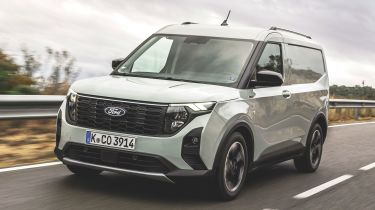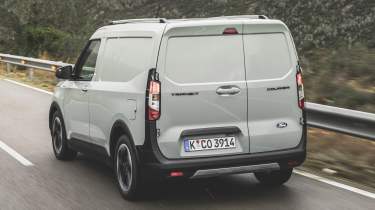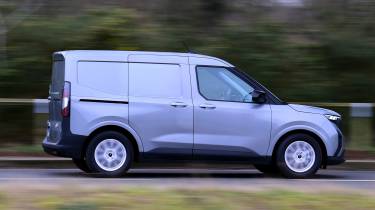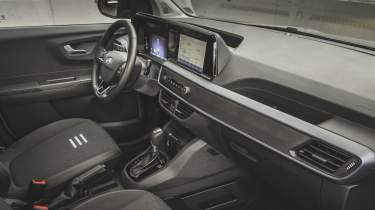Ford Transit Courier van review
Although the Ford Transit Courier is the baby of Blue Oval's van line-up, it's now bigger and more competent than ever
A growth spurt sees the Ford Transit Courier offer more space than ever, although while its prices still look relatively keen when compared with rivals, they’ve jumped up compared with the outgoing model’s. Still, this is a capable small van with a useful load bay, a well-judged range of powertrains (with an electric van option on the way) and a cabin that has all of the tech you might need.
About the Ford Transit Courier
Everyone has to grow up sometime, right? That’s clearly the case for the Ford Transit Courier; the baby of the Blue Oval’s commercial vehicle line-up has been treated to a whole new look for 2024, with fresh technology, an all-electric version and, yes, an increase in size.
Ford’s rationale behind the increase is that buyers of really small vans frequently want a bit more space – to the point where it’s more important to cover a larger percentage of the middle ground than the ultra-compact area at the bottom of the market where models such as the Fiesta SportVan once dwelled. So here, then, is the new Transit Courier – with a larger load bay in every appreciable dimension than the vehicle it replaces. Oh, and a higher price.
Underneath it all is Ford’s Global B platform, the same tech that supports the Puma small SUV (and, of course, the Transit Courier’s passenger-car sister, the Tourneo Courier). We’ve yet to see complete details on the electric E-Transit Courier, which won’t appear until later in 2024. But the technical offering on the regular edition is a pretty simple one; there’s a single diesel offering, a 1.5-litre EcoBlue producing 99bhp and 250Nm of torque, plus a pair of 1.0-litre three-cylinder EcoBoost petrols with either 99bhp/170Nm or 123bhp/170Nm. The standard gearbox is a six-speed manual, but the higher-powered EcoBoost can be ordered with a seven-speed dual-clutch automatic.
Used - available now
The van-specific numbers all look positive enough – assuming, that is, you fall into Ford’s list of customers who’ve been craving more load capacity from their Courier. The overall cargo length grows by more than 18cm, to 1,820mm, and an additional 200mm between the rear wheelarches means that the vehicle can now swallow two Euro pallets. The total cargo volume increases by a full 25 per cent, in fact, to 2.9 cubic metres, and while the maximum load length is now 1,802mm, you can extend this to 2,667mm by speccing the optional load-through bulkhead – handy for longer bits of timber or pipes.
Access to the cargo area is via a single sliding side door (a second door on the opposite side is available as an option) or twin barn doors, while the cab is a strict two-seater - the Courier is still fairly narrow, so adding a third centre chair was never going to be an option.
You may have noted that the Transit Courier only comes in one body style, where slightly larger rivals come with standard or long options. Those rivals include the Renault Kangoo/Nissan Townstar/Mercedes Citan trio, the Citroen Berlingo/Fiat Doblo/Peugeot Partner/Vauxhall Combo/Toyota Proace City quintet, plus there’s the slightly larger (and a bit pricier) Ford Transit Connect, which shares tech with the Volkswagen Caddy. However, the Courier’s positioning as a bumped-up entry-level model means that it is ever so slightly cheaper than the alternatives here.
MPG, CO2 and running costs
The line-up comprises four trim levels, starting with Limited. Available with all but the higher-powered manual petrol powertrain, it costs from around £18,000 (excluding VAT) and is, Ford rather charitably suggests, designed primarily for large fleet purchases. It still gets a decent level of basic kit, with an eight-inch touchscreen infotainment set-up, electric windows, heated and powered folding door mirrors, and a steel bulkhead. But it makes do without air conditioning or any side access to the load bay.
Trend brings those features (there’s a single sliding side door, with a second as an option), along with heating for the seats, steering wheel and windscreen – plus the chance to have 123bhp petrol power with the manual gearbox. Then there’s Limited, with climate control, 16-inch alloys, more body-coloured exterior parts, keyless go and a rear-view camera. The range peaks with Active, which has many of the same features as Limited, but gets styling tweaks, including larger 17-inch alloy wheels. The upper two editions aren’t available with the 99bhp petrol.
The engine with the best fuel economy is the diesel, which has a WLTP figure of 55.4mpg when fitted to the Leader model, this drifts out to 51.2mpg for the Active version, with the other two models somewhere in between.
Choose a petrol, and the drop off in the official fuel economy figures isn’t severe, but you’re looking at 43.5 to 42.8mpg for the manual models, and 42.8 to 41.5mpg for the Powershift automatic models.
Load space and practicality
There are two payload versions on combustion-engined Transit Couriers - 680kg as standard, and as a £150 (ex VAT) option, 845kg with dual-rate springs - this, Ford claims, is a 45 per cent increase over the outgoing Courier’s maximum. The forthcoming EV will manage 700kg, incidentally.
The Transit Courier’s numbers are decent enough in isolation, and the single standard sliding door opens an aperture that’s more than half a metre wide. But that cargo volume is smaller than you’ll find in the Renault Kangoo or even the smaller of Citroen’s Berlingo offerings, while the Ford’s max payload is also trumped by both of these competitors.
There’s a cargo volume of 2.9 cubic metres, which is only 0.2 cubic metres behind the capacity for Ford’s own Transit Connect in its standard length, while the load floor measures 1,802mm long and 1,535mm wide (or 1,220mm between the wheelarches). Add the through-loading option, and the load length at the floor increases to 2,667mm, which will be handy for longer items such as pipes or ducting.
The cargo area measures 1,253mm tall, while the load lip is 602mm, which is nice and low. The rear door opening measures 1,235mm wide and 1,120mm tall, while the sliding door has a gap measuring 528mm wide and 1,069mm tall.
Reliability and safety
Since it’s based on the Ford Puma’s platform, there has been plenty of time for any issues to have been ironed out ahead of the Courier’s launch. Of course, life as a working vehicle will be tougher than as a small SUV, but there shouldn’t be much to go wrong.
Safety kit is strong for a van. The usual ABS, stability control and traction control systems are included, plus there’s roll stability control, tyre pressure monitors, driver and passenger airbags (not all small vans have a passenger bag as standard), driver alertness warning, lane assist, rear parking sensors, traffic sign recognition, cruise control with intelligent speed limiter and a wrong-way assist. Optionally buyers can add blind-spot warning and lane-change assist, rear cross traffic alert, a rear-view camera, front parking sensors and adaptive cruise control.
One word of advice that we’d give is to make sure that the correct oil is used in the EcoBoost petrol engine when the Courier is serviced. The 1.0-litre motor features a so-called ‘wet belt’ cambelt, where it runs in the engine oil, and it has been known that using the wrong oil can cause the cambelt to deteriorate and break up, leaving you with the potential for costly repairs.
Driving and performance
Since the Transit Courier is based on the Puma platform, it can lay claim to being one of the best-handling vans on the market, while the driving position and big windows give you a clear view of your surroundings.
The diesel engine is the only one we’ve tried so far, and it’s a gutsy performer, with 250Nm of torque available from barely 2,000rpm – enough to make it feel brisk at times. There’s a bit of a rasping rattle if you push the motor into the higher reaches of its rev range, but in general there’s enough shove on tap for this to prove unnecessary – and what gurgle the engine does produce at a motorway cruise is comfortably drowned out by the rush of a van-shaped front end being shoved through the air. It does not feel like the last word in luxury; it does feel like a vehicle that you could point at a motorway and drive for many miles. And that’s probably bang on brief.
Away from cruising, it’s easy to flick between gears, thanks to a slick shift mechanism on the manual transmission. Perhaps it’s here where the Transit Courier feels closest to Ford’s passenger-car offerings, although there’s a familiar weight and accuracy to the steering, too, making the Transit Courier an easy vehicle to place, both in faster corners and tight urban streets. With around half the maximum payload on board, the ride felt comfortable yet composed (sticking with 16-inch wheels may help a little with this).
Cab and interior
The cabin has a fully digital instrument cluster and, more usefully for van users, a functional dash that includes an eight-inch infotainment system, complete with Apple CarPlay and Android Auto integration, plus a built-in mount that’s designed to house a variety of aftermarket smartphone holders. There’s overhead storage, plus a central bin for A4-sized folders and door pockets big enough to hold 1.5-litre bottles.
There’s a wide range of adjustment for the driver’s seat, so it’s easy to get comfortable, while the switchgear is shared with Ford’s passenger cars, so it’s good to use. There are plenty of hard-wearing plastics on board, and rubber flooring for hard use, although the higher spec versions feature carpets for added comfort and sound insulation.
Back-up matters in commercial vehicles, and the Transit Courier has always-on connectivity, allowing it to be integrated into and managed through the Ford Pro digital ‘fleet ecosystem’. In truth, most of the big van retailers offer similar back-up, although the sheer scale of Ford’s UK dealer network does give it a small advantage on support.
Van dimensions
| Panel van: | H:1,827/W:1,800/L:4,337mm |
Load area dimensions
| Standard: | H: 1,253mm/W: 1,535mm/L: 1,802mm/Volume: 2.9m3 |
| Thru load: | H: 1,253mm/W: 1,535mm/L: 2,667mm/Volume: N/A |

















